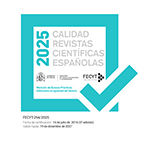Virtud republicana y virtud cortesana: el 'Fiesko' de Schiller y el 'Tasso' de Goethe
Résumé
Este artículo compara dos dramas de Schiller y Goethe. Respectivamente Die Verschwörung des Fiesko zu Genua (1783) y Torquato Tasso (1790). Fiesko presenta la pugna por la restauración de la república genovesa que acabe con el despótico dictado de los Doria. Tasso expone las dificultades de un poeta que desarrolla su escritura en un ámbito cortesano. Es decir, Schiller escribe sobre la virtud republicana y Goethe sobre la cortesana. Los conflictos dramáticos son significativos de sus tipologías de lo trágico. Schiller en la colisión despotismo-libertad política, Goethe en la coerción que un marco externo ejerce sobre la individualidad. Lo irresoluble de ambos conflictos es indicio de las contradicciones de la virtud republicana y la cortesana.
Téléchargements
##submission.format##
Licence
La Revista de Filología Alemana, para fomentar el intercambio global del conocimiento, facilita el acceso sin restricciones a sus contenidos desde el momento de su publicación en la presente edición electrónica, y por eso es una revista de acceso abierto. Los originales publicados en esta revista son propiedad de la Universidad Complutense de Madrid y es obligatorio citar su procedencia en cualquier reproducción total o parcial. Todos los contenidos se distribuyen bajo una licencia de uso y distribución Creative Commons Reconocimiento 4.0 (CC BY 4.0). Esta circunstancia ha de hacerse constar expresamente de esta forma cuando sea necesario. Puede consultar la versión informativa y el texto legal de la licencia.










